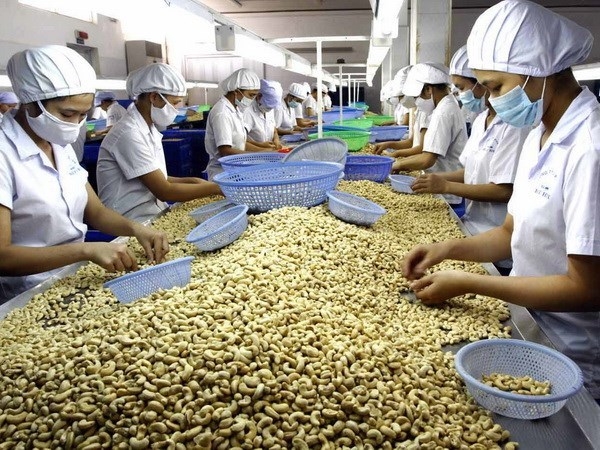Support required to grasp customs boon
 |
| Illustrative image. Photo: VNA |
In the first days of June, the General Department of Vietnam Customs (GDVC) decided to extend a preferential customs treatment afforded to authorised economic operators (AEOs) for three foreign-invested enterprises (FIEs) – Sonion Vietnam Co., Ltd., Pou Chen Vietnam Enterprise Ltd., and Vedan Vietnam Co., Ltd.
These are three of the slightly more than 70 businesses which have fully met the criteria for preferential customs treatment by Vietnamese authorities, according to the Post-Clearance Inspection Department of the GDVC, the unit implementing the Priority Enterprise Programme.
Jack Nguyen, partner at audit, accounting and consulting firm Mazars, told VIR that 70 is a relatively low number, considering that about 80,000 export-oriented processing enterprises are operating in Vietnam.
“Many of these enterprises want to be recognised as AEOs and the ideal number should be in the range of 10-15 per cent of all enterprises operating in Vietnam,” he said.
The Ministry of Finance has set six groups of conditions that companies must satisfy to apply for AEO treatment, including substantial export-import volumes, legal compliance, and more. Nguyen believed that it is in everyone’s interests that more FIEs are able to qualify for preferential customs treatment. “Customs authorities could guide FIEs on the procedures to qualify. Any sanctions applied to non-compliant FIEs should be done with the intent to help them achieve compliance rather than be an exercise in penalising them,” Nguyen said.
Of the roughly 70 businesses enjoying AEO status in Vietnam, there are 14 from Japan, including Panasonic, Canon, and Sumidenso. South Korea contributes 12 names, including Samsung, the country’s largest exporter. Others are FIEs from the United States, Taiwan, Italy, Denmark, and Russia with Vietsovpetro, a Vietnamese-Russian oil venture.
While most recognised foreign AEOs operate in the high-tech sector, many domestic enterprises are in the agricultural sector, especially the seafood segment.
As one of the first recognised AEOs in 2011, Samsung Electronics Vietnam Co., Ltd. (SEV) based at Yen Phong Industrial Park in the northern province of Bac Ninh reported substantial benefits from the programme. A representative of SEV told VIR said that previously, the company had to submit about 360-600 declarations each month, each taking an hour to prepare. Now, all export batches are exempt from physical inspection and goods are cleared immediately. Additionally, SEV does not have to pay tax before customs clearance. Instead, it is allowed to delay payments until the 10th day of the next month.
With contributions from the Priority Enterprise Programme, SEV’s export-import turnover increased from $13 billion in 2012 to nearly $18.5 billion in 2019.
Similarly, Datalogic Vietnam Co., Ltd., located in Saigon Hi-Tech Park in Ho Chi Minh City, has also shared great benefits since being accredited in 2014. “The incentives save Datalogic around $500,000 a year. It has also allowed the company an on-time delivery rate from 89 to 98 per cent,” the company reported.
| LG Electronics failing to adhere to customs rules In early June, preferential customs treatment for LG Electronics Vietnam Co., Ltd. was suspended for two months for failing to properly perform its responsibilities as per Article 45 of the Law on Customs. As the largest foreign-invested enterprise in Haiphong with $1.5 billion investment, LG Electronics Vietnam was granted preferential customs treatment by the General Department of Customs in 2017. According to Article 45, AEOs need to comply with three requirements: - Annually provide customs authorities with audit reports and financial statements; - Comply with inspection and supervision regulations of customs authorities; - Notify customs authorities of competent agencies’ decisions on handling of enterprises’ violations of tax and accounting laws. |
What the stars mean:
★ Poor ★ ★ Promising ★★★ Good ★★★★ Very good ★★★★★ Exceptional
Related Contents
Latest News
More News
- State corporations poised to drive 2026 growth (February 03, 2026 | 13:58)
- Why high-tech talent will define Vietnam’s growth (February 02, 2026 | 10:47)
- FMCG resilience amid varying storms (February 02, 2026 | 10:00)
- Customs reforms strengthen business confidence, support trade growth (February 01, 2026 | 08:20)
- Vietnam and US to launch sixth trade negotiation round (January 30, 2026 | 15:19)
- Digital publishing emerges as key growth driver in Vietnam (January 30, 2026 | 10:59)
- EVN signs key contract for Tri An hydropower expansion (January 30, 2026 | 10:57)
- Vietnam to lead trade growth in ASEAN (January 29, 2026 | 15:08)
- Carlsberg Vietnam delivers Lunar New Year support in central region (January 28, 2026 | 17:19)
- TikTok penalised $35,000 in Vietnam for consumer protection violations (January 28, 2026 | 17:15)

 Tag:
Tag:




















 Mobile Version
Mobile Version